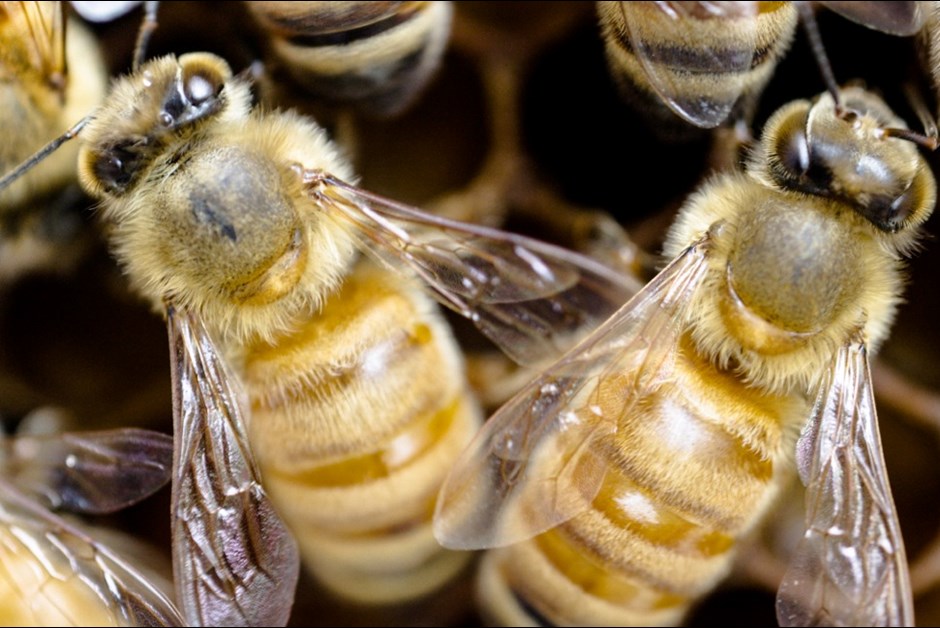A Honey of a Summer ~ The Buzz on Bees with Bee Butler Michael King (July 2015)
Learn more about Fairmont Waterfront or make a booking.
This summer which officially started on June 21st really started for us as early as the first days of June and it has been almost non stop heat and sunshine since !
I’m not sure if it is my imagination but I have noticed more butterflies and bees , especially our native bees in and around our gardens and perhaps it is no surprise that there also appears to be a greater abundance of fruits on bushes and trees than in previous years.
Our bee house in our herb garden is a great addition to our ‘pollinator corridor initiative’ but will not be occupied this year with native bees. However we will be looking with great interest early next spring for signs that some of our over 500 native bee species in British Columbia have decided to call our Bee house their own home !
What’s happening in the world of the honey bees in our apiary ? The nectar flow has been very significant so far this season and it appears that many fruits and crops are at least 3 weeks or a month ahead of schedule for harvesting which has meant that the bees have had a very plentiful supply of nectar. Word of mouth from our local beekeepers who work with us from Hives for Humanity and the Honey Bee Centre tell us that this is one of the most successful seasons in recent memory thus far due to the weather conditions. However the truth is that along with hot dry weather with little or no precipitation comes the increasing chance of a major slowdown in the nectar flow as plants get heat stressed and fail to regenerate and rebloom which in turn means that nectar flow will slow down to a potential trickle.
Thus the trick to making the most of the nectar flow that has already come in is to start harvesting the honey in the frames right now and create conditions that will allow the bees to continue to work at providing more nectar. This is achieved by removing frames of honey and replacing them with empty frames. As we inch towards August the bee keepers work towards building their colony strength by reducing the honey supers above the brood chamber and slowly but surely starting the process of overwintering. To a bee keeper in British Columbia, August 15th is a significant date in the calendar and the beginning of the process of preparing your colony for overwintering. It is hard to believe that we would be talking about overwintering in the middle of a blazing hot summer but as with most planning, the earlier the strategies are begun the better the success is likely to be down the road.
Our last inspections of our four hives on our rooftop apiary last Saturday showed that we have 2 colonies that are thriving and 2 that are starting to strengthen following some early season challenges with brood growth and our observation hive has proven to be a great attraction for our guests with it’s information poster adorning the door of the hive which provides some wonderful facts about our bees as well as some facts about native species.
We have provided bee tours to over 200 of our guests and visitors to Fairmont Waterfront so far this summer which is almost twice the number we achieved this time last year. This speaks volumes to the initiatives we have put into place that involve information pieces around the hotel , our recent honeybee house and grand opening event with Burts bees as well as our enhanced bee tour content which now involves our herb garden area and the product growing there as well as our Honeybee apiary.
All signs point to continued hot and dry weather courtesy of a very significant El Nino event out in the Pacific and as appears to be the case in our ever evolving and changing global climate we need to be prepared for the unexpected and the unusual where weather is concerned. If you are a beekeeper this means trying to stay ahead of the curve to an even greater degree so colony health and strength is maximized giving you and your bees the best chance of survival over the winter months and ready to start next spring in good shape.
Learn more about our bees at: http://bit.ly/greenhotelinitiatives
For #BeeButler posts visit: http://bit.ly/beebutlerblog
#FairmontBuzz #WildforBees
